CHUWI V88 - another copy * well, you yourself know what *
Having mastered the cloning of the “big” iPad, the Chinese began to work on its younger version, and most recently we talked about one of these devices - the Onda V818 mini tablet. Today's representative of the line of clones of iPad mini is called Chuwi V88 and in more detail I will tell about it under the cut.

 7.9- inch IPS screen with a resolution of 1024x768
7.9- inch IPS screen with a resolution of 1024x768
 Quad - core Rockchip RK3188 (Cortex A9) processor with an operating frequency of 1.6 GHz
Quad - core Rockchip RK3188 (Cortex A9) processor with an operating frequency of 1.6 GHz
 Mali-400 MP4 video accelerator with a clock frequency of up to 533 MHz
Mali-400 MP4 video accelerator with a clock frequency of up to 533 MHz
 Android operating system JB 4.1.1 (with possibility of upgrade to 4.2.2 )
Android operating system JB 4.1.1 (with possibility of upgrade to 4.2.2 )
 2 GB of RAM
2 GB of RAM
 16/32 GB user memory + microSD memory card slot
16/32 GB user memory + microSD memory card slot
 2 cameras : rear 5 megapixel (autofocus) and front megapixel 2 megapixel
2 cameras : rear 5 megapixel (autofocus) and front megapixel 2 megapixel
 Communications: Wi-Fi (802.11 b / g / n), Bluetooth 4.0
Communications: Wi-Fi (802.11 b / g / n), Bluetooth 4.0
 Optional: USB OTG
Optional: USB OTG
 Li-pol 5000 mAh battery
Li-pol 5000 mAh battery
 Dimensions: 201x136.6x7.2 mm
Dimensions: 201x136.6x7.2 mm
 Weight: 346.5 grams
Weight: 346.5 grams
On the market the tablet is presented in two colors - white and black. Versions with 1 and 2 GB of RAM are also available, the price for the youngest starts from ~ 170 dollars.
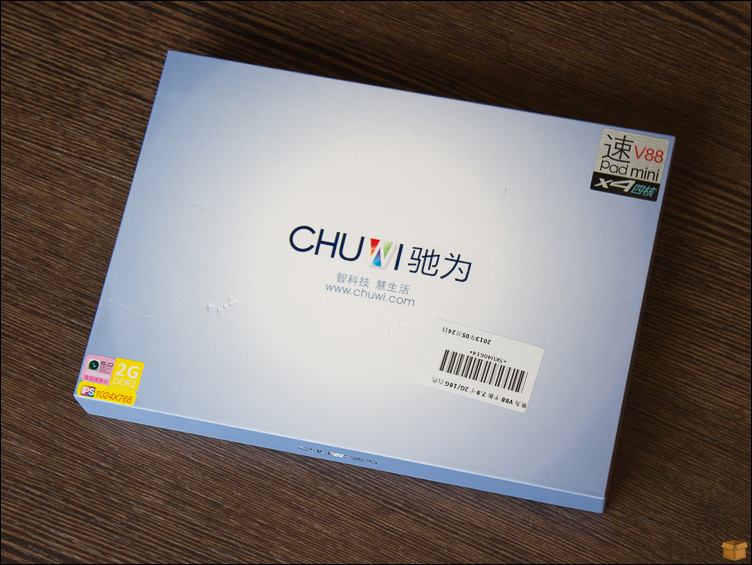
So thin that the power supply unit ceased to intervene in them and comes in a separate box. I must say that the idea is far from the best, since the mail of our parcels does not regret. Fortunately, my adapter was not affected.

Here we find the first minus of the device. To charge the Chuwi V88 uses a separate port, instead of the usual Micro USB. Of course, this approach gives us a gain in charging time (assuming a powerful power supply), but in this case, recharging your device at a party / at work does not work if you don’t carry the memory everywhere.
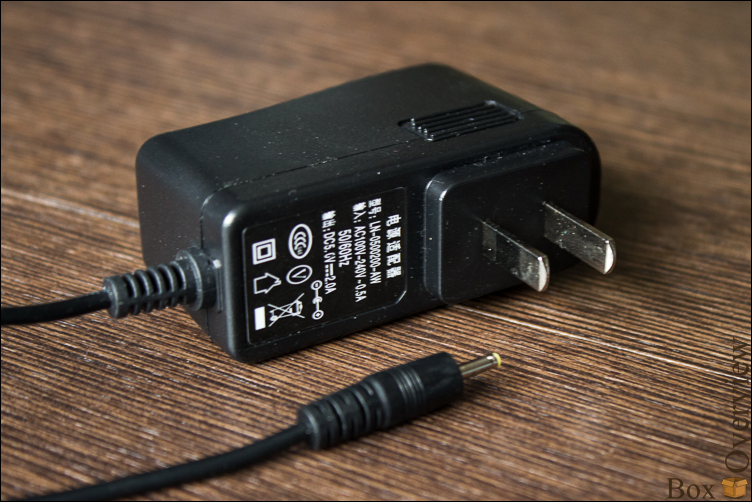
In addition to the tablet itself and the above-mentioned charger, the box contains: a USB-OTG cable (for connecting 3G modems or USB flash memory), a wire for connecting to a computer and a little waste paper.
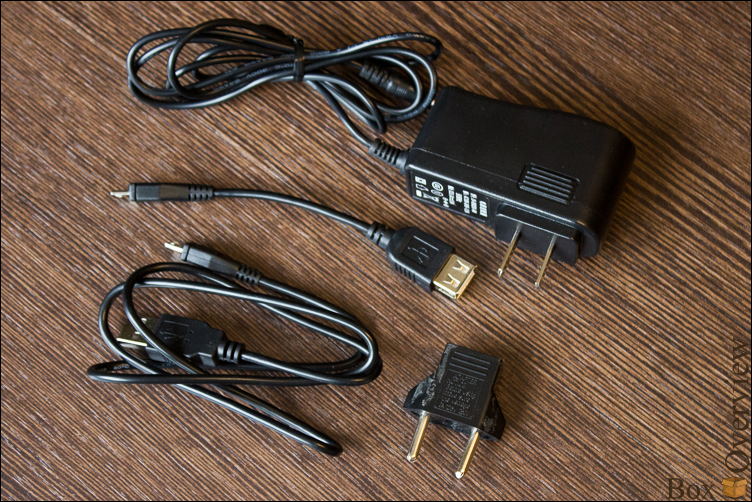
The package bundle is minimal, but everything you need to fully use the tablet is present. Despite the fact that the box is thin, it is made of durable cardboard and the chance to damage the tablet itself is reduced to nothing.
')
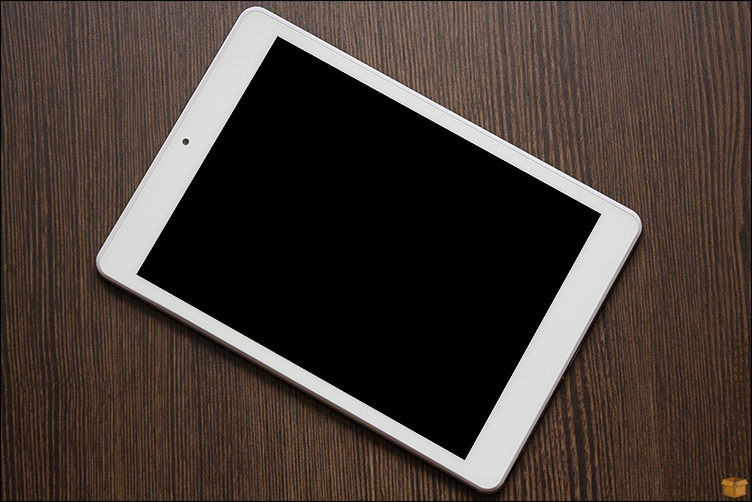
All connectors are located on the bottom (from left to right): HDMI output, microUSB connector, a separate connector for charging the device, 3.5 mm mini-jack, microphone hole and a slot for MicroSD memory cards, the latter, by the way, stand out a little, somewhere on 1 mm, but it does not cause special discomfort.
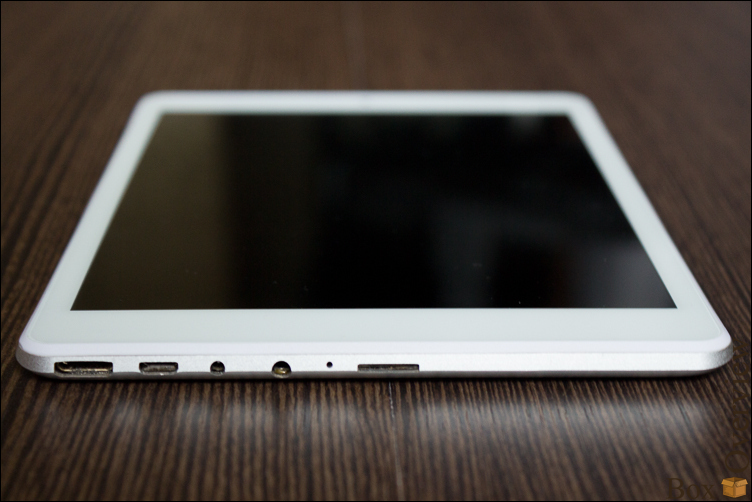
Behind, in the upper left corner, is the eye of the main camera, and just below - the volume and power buttons. To the latter, many users have claims, they say the buttons are beyond the scope of the case. Well, where can they go? All buttons to a greater or lesser extent beyond the scope of the case. The disadvantage lies in the fact that they are on the back cover, as a result, to unlock the device when it lies on a flat surface - it will not work.
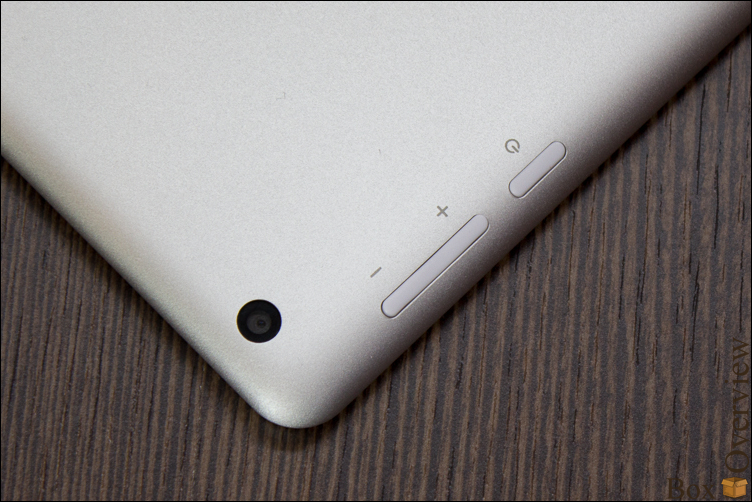
The speaker is also located on the rear panel (on the left, but already below). Despite the fact that he is alone here, it sounds loud enough and does not rattle.
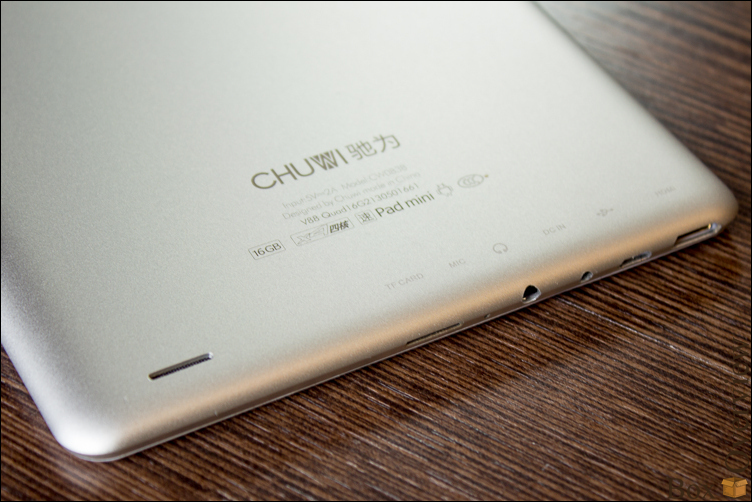
Plus for a nice look and good build quality. Minus for the location of the buttons, because it is not convenient.
lamp.
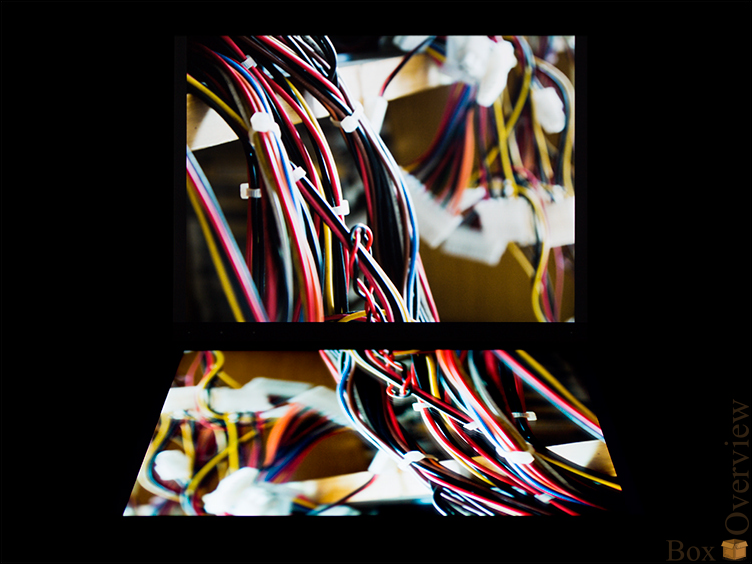
But the maximum brightness is barely enough for an overcast summer day, respectively, in the bright sun to see something on the screen will be unrealistic.

I’m asking you not to start battles for permission, it’s enough for someone, not for someone. Most likely in the new generation of iPad mini, a matrix with a higher resolution will be installed, and if this is true, then soon we should expect tablets with similar screens from our Chinese brothers.
We proceed directly to the testing. The device gains about 17 thousand points in the Antutu test and 5327 in the Quadrant:


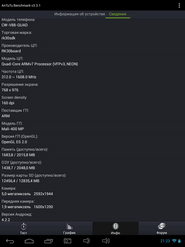
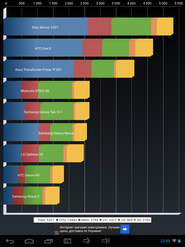
Multitouch in the tablet supports up to 10 simultaneous touches. From sensors available only accelerometer.
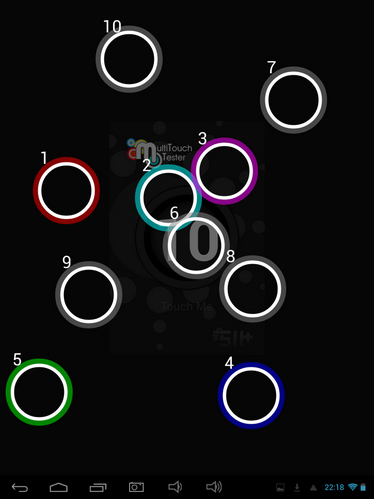

The sad fact is that among Chinese devices marriage is quite common. So, some users have problems with Wi-Fi (short range, periodically "falls off", etc.). My device does not suffer from such “sores”, moreover it shows a stable signal (-50 dBm) at a distance of five meters and with a barrier in the form of a brick wall. The first screenshot shows the signal level while being in close proximity to the router.
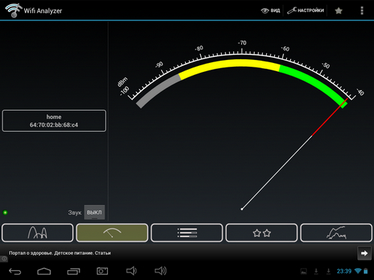

With one of its main tasks, I mean browsing Chuwi V88 copes with a bang. Page load time is 3-4 seconds, scrolling smooth, pleasant to surf.
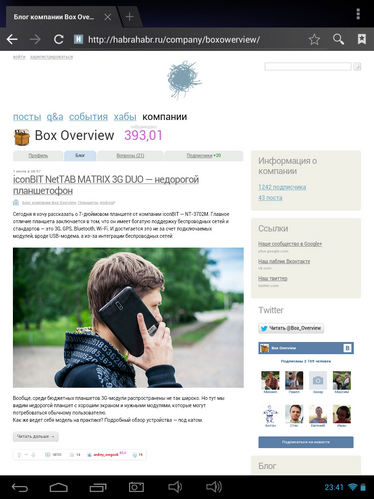
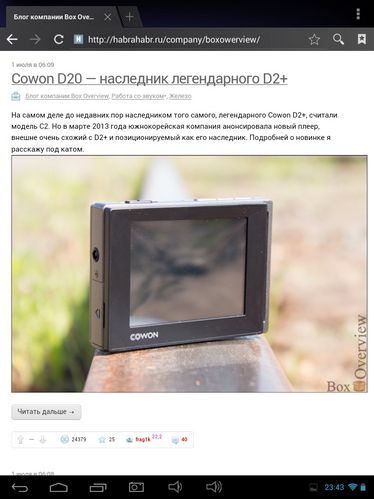
In the new test (for mobile platforms) 3DMark device also shows relatively average results.

NenaMark 2.4 test:
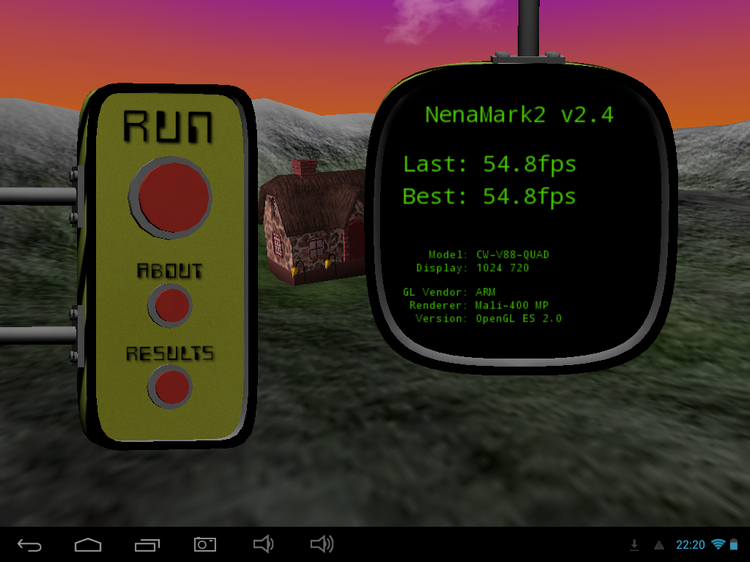
The power of the not so advanced Mali-400 MP4 video accelerator is enough for most of the 3D games available on the Play Market. For example, the once-beloved by me GTA Vice City is played very smoothly and without the slightest slowdown.

Real Racing 3, apparently, was established with high graphics settings, with the result that the number of FPS fluctuates (by eye) in the region of 20-25, but you can still play.
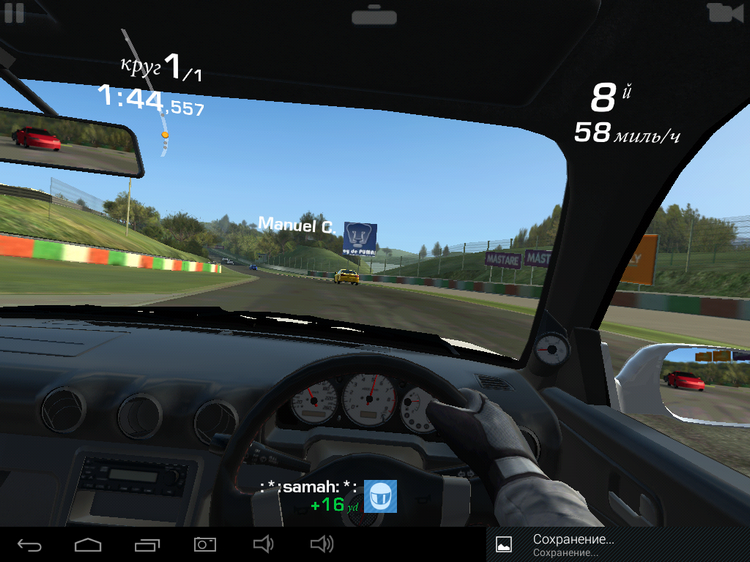
It is logical to assume that problems with 2D games should not arise at all. Video up to Full HD is played without problems. Summing up, we can say that productivity is more than enough for everyday tasks as well as for games.
Actually the instruction itself (the original is here , I just recited it in my own words and in Russian):
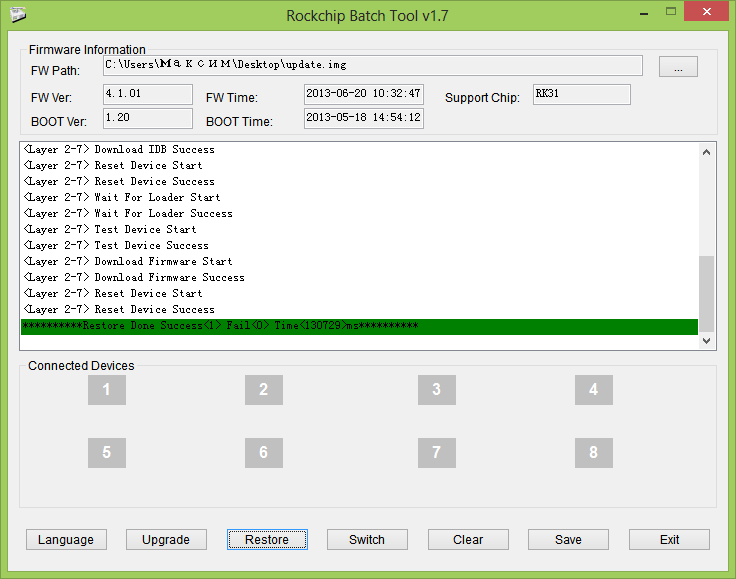
With the release of Android 4.2.2 for tablets, Google presented us a very unpleasant surprise by installing the phone interface by default and without the ability to change it to a tablet.

In order to eliminate this unfortunate drawback, you need to install a special tweak developed by foreign enthusiasts, but this can be done only with the help of CWM-recovery, so first we will install it.
Step-by-step instruction:

About getting Root rights read here (2nd method). It is not surprising that the link leads to instructions for another tablet, it, like the hero of our review today, is based on the RK3188 processor, as a result of which the procedure for obtaining Root access is the same.
It remains to return the tablet to the usual interface. Download tweak and “throwing” it into the root of user memory. Now go to recovery -> install zip from sdcard -> choose zip from sdcard and select the archive that we previously downloaded. After that, once again we restart the device and ... voila! Is done.
tweak and “throwing” it into the root of user memory. Now go to recovery -> install zip from sdcard -> choose zip from sdcard and select the archive that we previously downloaded. After that, once again we restart the device and ... voila! Is done.

Talking about pure Android 4.2.2 is a waste of time, since the network is full of reviews of this OS. I would like to note the phenomenally smooth (as for the Chinese device) work of the standard launcher and interface, if not for one thing. The tablet has the ability to hang when performing several tasks at the same time (installing the application from the market, browsing and playing music) and this is with four cores! Not that annoying, but an unpleasant aftertaste remains.
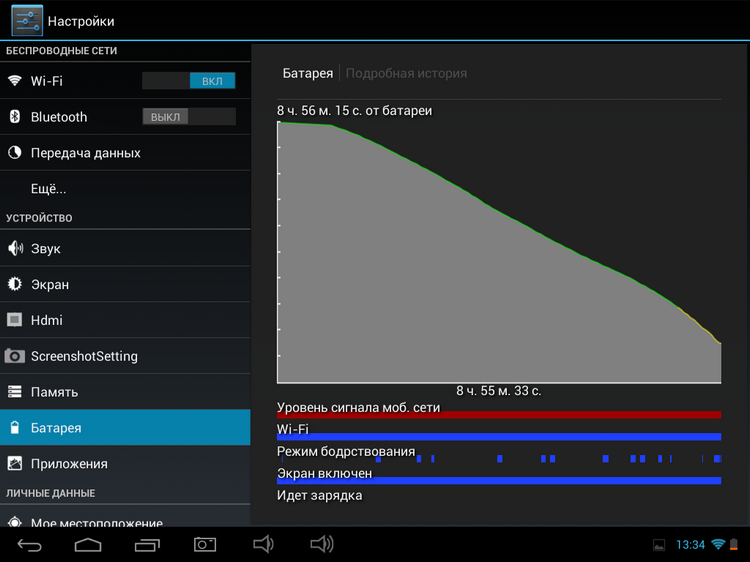
Antutu Tester confirms my words, giving out 1028 points.
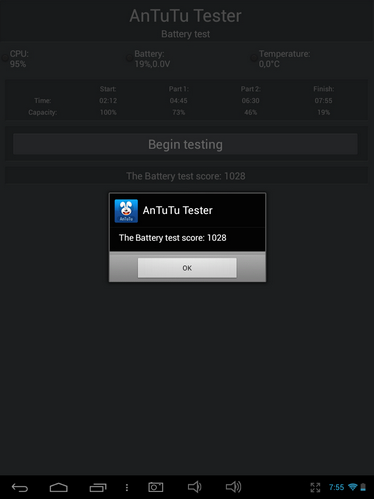
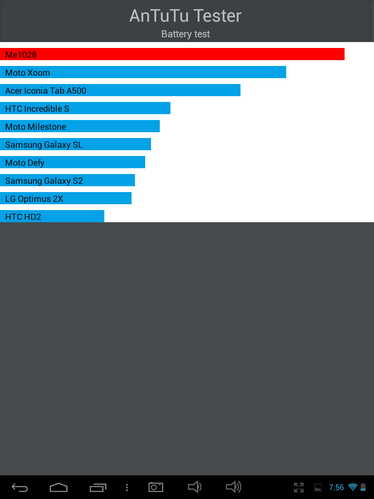
Excellent result. Autonomy is one of the strengths of the tablet.
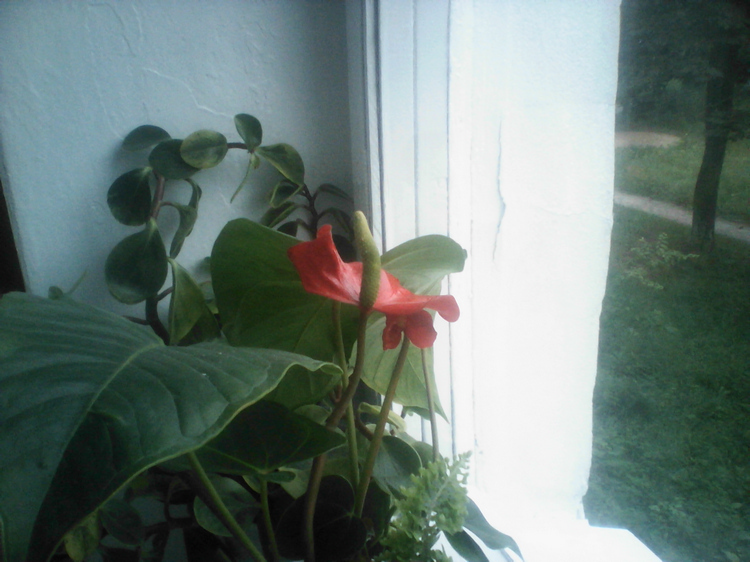
The back here is just for show.

 Low cost
Low cost
 High quality build and materials
High quality build and materials
 Productive hardware platform
Productive hardware platform
 Good autonomy
Good autonomy
 Bluetooth availability
Bluetooth availability
 USB-OTG support, HDMI port and microSD card slot
USB-OTG support, HDMI port and microSD card slot
 Periodic freezes
Periodic freezes
 Subjectively - low screen brightness
Subjectively - low screen brightness
 Separate memory, that is, the impossibility of charging from USB
Separate memory, that is, the impossibility of charging from USB
 Button layout
Button layout
 Lack of 3G and GPS
Lack of 3G and GPS
Also until July 5, the Chuwi V88 tablet has a $ 15 discount . To use it, you need to enter the coupon code V88CHUWI (valid for all tablet models) when placing an order.
Discussion topic on xda-developers
Page on the official site
Manual disassembly tablet (in Chinese)
If you do not have an account on Habrahabr, you can read and comment on our articles on BoxOverview.com

 7.9- inch IPS screen with a resolution of 1024x768
7.9- inch IPS screen with a resolution of 1024x768 Quad - core Rockchip RK3188 (Cortex A9) processor with an operating frequency of 1.6 GHz
Quad - core Rockchip RK3188 (Cortex A9) processor with an operating frequency of 1.6 GHz Mali-400 MP4 video accelerator with a clock frequency of up to 533 MHz
Mali-400 MP4 video accelerator with a clock frequency of up to 533 MHz Android operating system JB 4.1.1 (with possibility of upgrade to 4.2.2 )
Android operating system JB 4.1.1 (with possibility of upgrade to 4.2.2 ) 2 GB of RAM
2 GB of RAM 16/32 GB user memory + microSD memory card slot
16/32 GB user memory + microSD memory card slot 2 cameras : rear 5 megapixel (autofocus) and front megapixel 2 megapixel
2 cameras : rear 5 megapixel (autofocus) and front megapixel 2 megapixel Communications: Wi-Fi (802.11 b / g / n), Bluetooth 4.0
Communications: Wi-Fi (802.11 b / g / n), Bluetooth 4.0 Optional: USB OTG
Optional: USB OTG Li-pol 5000 mAh battery
Li-pol 5000 mAh battery Dimensions: 201x136.6x7.2 mm
Dimensions: 201x136.6x7.2 mm Weight: 346.5 grams
Weight: 346.5 gramsOn the market the tablet is presented in two colors - white and black. Versions with 1 and 2 GB of RAM are also available, the price for the youngest starts from ~ 170 dollars.
► Packing and packaging
Recently, some Chinese companies have become fashionable to make boxes with tablets thin, in order to emphasize this characteristic of the devices themselves.
So thin that the power supply unit ceased to intervene in them and comes in a separate box. I must say that the idea is far from the best, since the mail of our parcels does not regret. Fortunately, my adapter was not affected.

Here we find the first minus of the device. To charge the Chuwi V88 uses a separate port, instead of the usual Micro USB. Of course, this approach gives us a gain in charging time (assuming a powerful power supply), but in this case, recharging your device at a party / at work does not work if you don’t carry the memory everywhere.

In addition to the tablet itself and the above-mentioned charger, the box contains: a USB-OTG cable (for connecting 3G modems or USB flash memory), a wire for connecting to a computer and a little waste paper.

The package bundle is minimal, but everything you need to fully use the tablet is present. Despite the fact that the box is thin, it is made of durable cardboard and the chance to damage the tablet itself is reduced to nothing.
')
► Design, build quality
The narrow frames on the sides of the display, the small thickness of the device itself - does not resemble anything? Nevertheless, a knowledgeable person will immediately distinguish a copy from the original and the reason for this is the lack of the Home button.
All connectors are located on the bottom (from left to right): HDMI output, microUSB connector, a separate connector for charging the device, 3.5 mm mini-jack, microphone hole and a slot for MicroSD memory cards, the latter, by the way, stand out a little, somewhere on 1 mm, but it does not cause special discomfort.

Behind, in the upper left corner, is the eye of the main camera, and just below - the volume and power buttons. To the latter, many users have claims, they say the buttons are beyond the scope of the case. Well, where can they go? All buttons to a greater or lesser extent beyond the scope of the case. The disadvantage lies in the fact that they are on the back cover, as a result, to unlock the device when it lies on a flat surface - it will not work.

The speaker is also located on the rear panel (on the left, but already below). Despite the fact that he is alone here, it sounds loud enough and does not rattle.

Plus for a nice look and good build quality. Minus for the location of the buttons, because it is not convenient.
► Display
First of all, I want to thank Apple for putting tablets with thin frames and 7.9-inch displays in a trend at a 4: 3 aspect ratio. No, well, it's really convenient, especially when reading magazines, technical literature and browsing. The display installed in this tablet, if not from the iPad mini, is very similar to that: excellent viewing angles, warm color,
But the maximum brightness is barely enough for an overcast summer day, respectively, in the bright sun to see something on the screen will be unrealistic.

I’m asking you not to start battles for permission, it’s enough for someone, not for someone. Most likely in the new generation of iPad mini, a matrix with a higher resolution will be installed, and if this is true, then soon we should expect tablets with similar screens from our Chinese brothers.
► Hardware platform performance
The Chuwi V88 tablet is based on the quad-core Rockchip RK3188 processor, with a clock frequency of 1.6 GHz (overclocking to 1.8-2 GHz is possible) and the Mali-400 MP4 graphics core. This is one of the most productive solutions used in Chinese tablets as of July 2013. In addition, the device carries onboard 2 GB of RAM and you can already forget about the tabs closing in Chrome when launching “voracious” toys.We proceed directly to the testing. The device gains about 17 thousand points in the Antutu test and 5327 in the Quadrant:




Multitouch in the tablet supports up to 10 simultaneous touches. From sensors available only accelerometer.


The sad fact is that among Chinese devices marriage is quite common. So, some users have problems with Wi-Fi (short range, periodically "falls off", etc.). My device does not suffer from such “sores”, moreover it shows a stable signal (-50 dBm) at a distance of five meters and with a barrier in the form of a brick wall. The first screenshot shows the signal level while being in close proximity to the router.


With one of its main tasks, I mean browsing Chuwi V88 copes with a bang. Page load time is 3-4 seconds, scrolling smooth, pleasant to surf.


In the new test (for mobile platforms) 3DMark device also shows relatively average results.

Screenshots with detailed results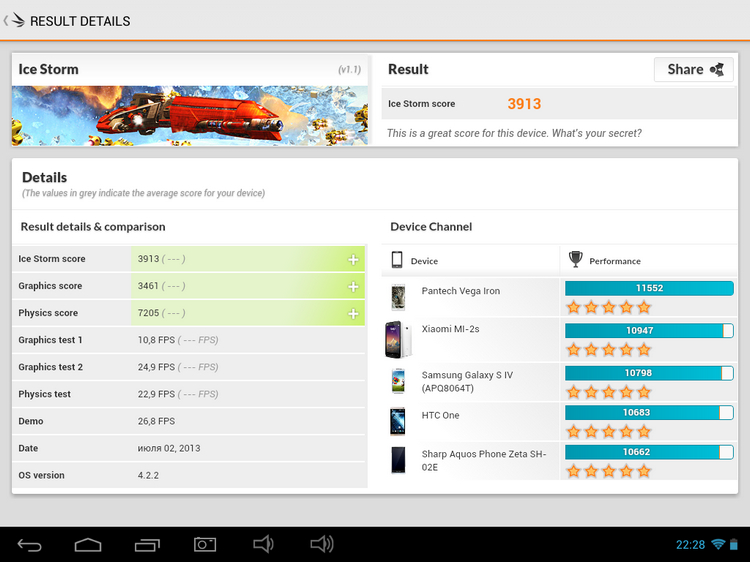



NenaMark 2.4 test:

The power of the not so advanced Mali-400 MP4 video accelerator is enough for most of the 3D games available on the Play Market. For example, the once-beloved by me GTA Vice City is played very smoothly and without the slightest slowdown.

Additional screenshots
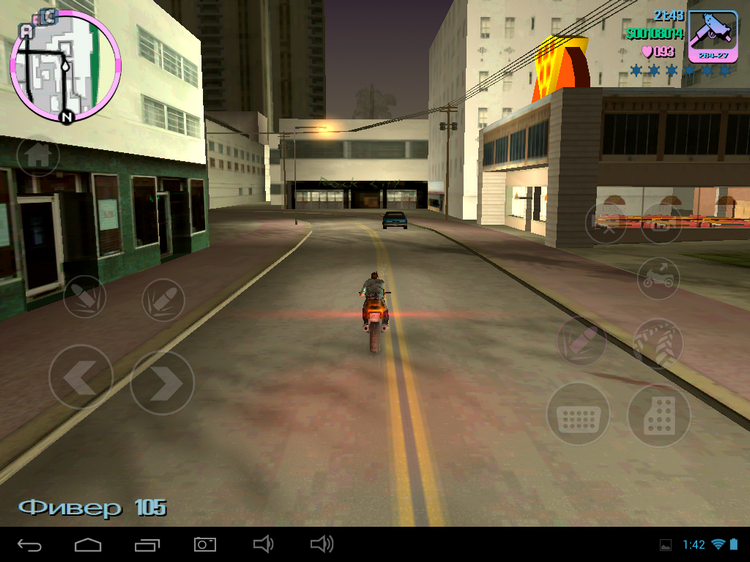


Real Racing 3, apparently, was established with high graphics settings, with the result that the number of FPS fluctuates (by eye) in the region of 20-25, but you can still play.

Additional screenshots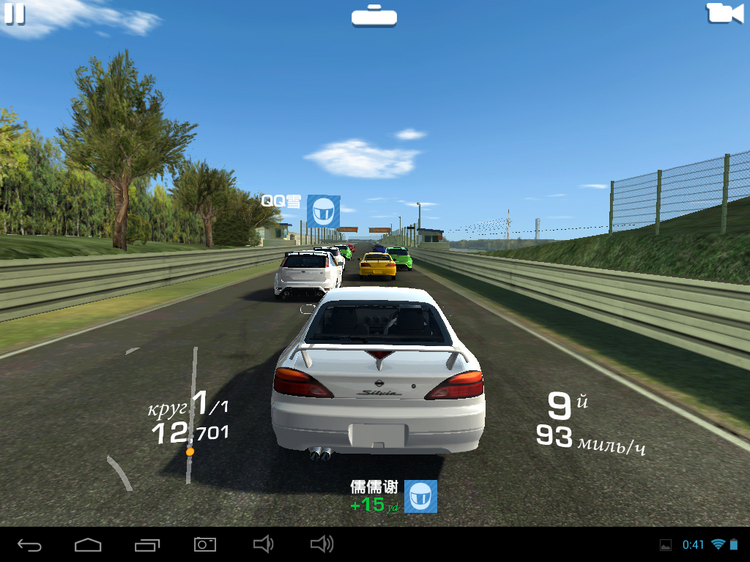
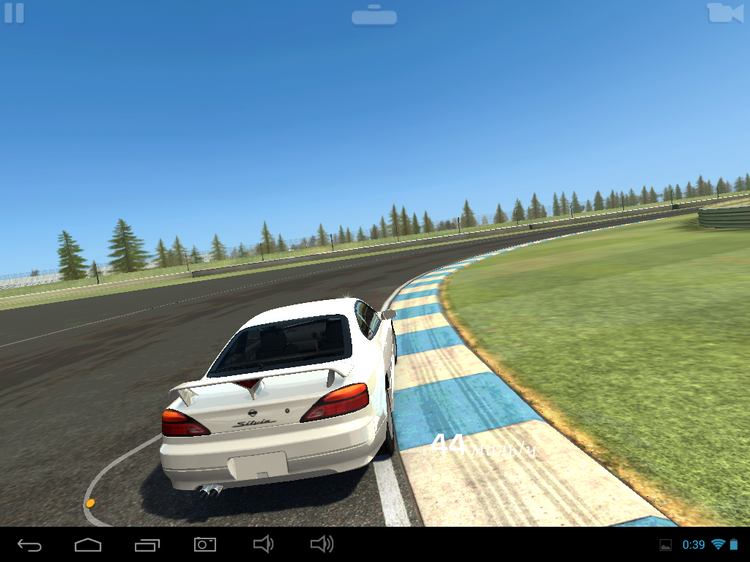


It is logical to assume that problems with 2D games should not arise at all. Video up to Full HD is played without problems. Summing up, we can say that productivity is more than enough for everyday tasks as well as for games.
► Operating system and software
The device comes preloaded with Android OS version 4.1.1, also known as Jelly Bean. At the time of this writing, the latest firmware is Android 4.2.2, respectively, all the tests were already done on it, and below I will tell you how to install it on your tablet.Actually the instruction itself (the original is here , I just recited it in my own words and in Russian):
- Download the latest firmware
 here and the program RKBatchTool v1.7 (along with the drivers)
here and the program RKBatchTool v1.7 (along with the drivers)  here
here - We unpack the archive with the firmware simultaneously installing the drivers that are in the archive with the program RKBatchTool.
- Make sure that when you connect the tablet to your computer, you are set to Mass Storage. To do this, go to Settings -> Memory, click on the three dots in the upper left corner and select "USB connection to computer" in the dialog box.
- We connect the tablet to the computer and, on behalf of the administrator, launch the RKBatchTool program.
- When the Rockhip Batch Tool 1.7 is loaded, the pink indicator in the "Connected devices" section should light up, this means that your Chuwi V88 has been detected.
- Click the button in front of the “FW Path:” line and open the update.img file (the previously downloaded and unpacked firmware image).
- Use the Switch button to enter the tablet into the firmware update mode. As a result, the screen will turn off, and the indicator color in the flasher program will change from pink to green.
- By clicking on Restore, the formatting and the subsequent firmware of the device will begin (the indicator will flash in yellow).
- After the end of the firmware, standard Android recovery will start and will format the / data / cache and / mnt / sdcard / partitions on its own.
- The first download after updating the software can take quite a long time, so please be patient. And yet, by default, the Chinese language will be installed in the tablet, but you can change it to your native one in 3 steps: click on the settings icon -> in the menu on the left side, select the line with the symbol “A ...” -> in the menu on the right side choose the second line and at the end of the list we find the Russian language.

With the release of Android 4.2.2 for tablets, Google presented us a very unpleasant surprise by installing the phone interface by default and without the ability to change it to a tablet.

In order to eliminate this unfortunate drawback, you need to install a special tweak developed by foreign enthusiasts, but this can be done only with the help of CWM-recovery, so first we will install it.
Step-by-step instruction:
- Download
 archive with an alternative firmware from Oma rocks and the necessary tools for its installation.
archive with an alternative firmware from Oma rocks and the necessary tools for its installation. - Turn off the device.
- While holding down the “Volume +” key, we connect the tablet to the computer via a USB cable.
- If you have not yet installed the driver, now is the time to do it.
- On behalf of the administrator, launch the RKAndroidTool application, which is located in the RKDevelopTool_v1.37 folder. After launch, at the bottom of the application, a confirmation should appear that the device is detected (Found RKAndroid Loader Rock Usb).
- If you want to completely install custom firmware, feel free to click EraseIDB first and then Run. I'm not a fan of such assembled “on the knee” firmwares, and I set myself only CWM-recovery. To do this, remove all the checkboxes except the sixth one and click Run.
- As a result of all the manipulations, Chuwi V88 will reboot, all that remains is to install a small utility for quick access to CWM-recovery (Root is required), you can also enter recovery by turning on the tablet with the “Volume +” button previously pressed.

About getting Root rights read here (2nd method). It is not surprising that the link leads to instructions for another tablet, it, like the hero of our review today, is based on the RK3188 processor, as a result of which the procedure for obtaining Root access is the same.
It remains to return the tablet to the usual interface. Download
 tweak and “throwing” it into the root of user memory. Now go to recovery -> install zip from sdcard -> choose zip from sdcard and select the archive that we previously downloaded. After that, once again we restart the device and ... voila! Is done.
tweak and “throwing” it into the root of user memory. Now go to recovery -> install zip from sdcard -> choose zip from sdcard and select the archive that we previously downloaded. After that, once again we restart the device and ... voila! Is done.
Talking about pure Android 4.2.2 is a waste of time, since the network is full of reviews of this OS. I would like to note the phenomenally smooth (as for the Chinese device) work of the standard launcher and interface, if not for one thing. The tablet has the ability to hang when performing several tasks at the same time (installing the application from the market, browsing and playing music) and this is with four cores! Not that annoying, but an unpleasant aftertaste remains.
► Autonomous work
Chuwi V88 is equipped with one of the most capacious batteries among all the iPad mini clones, and you should not forget about the energy-efficient platform that underlies it. When watching a video (over the network, i.e. Wi-Fi constant operation and backlighting for 10 of 15 divisions), the device lasted almost 9 hours at 400p resolution, that is, I, in one sitting, overcame 12 episodes of season 8 House MD (TV series interesting to the horror) + 15% more battery power left.
Antutu Tester confirms my words, giving out 1028 points.


Excellent result. Autonomy is one of the strengths of the tablet.
► Camera
The quality of the front camera is enough to talk on Skype.
The back here is just for show.

► Results
Chuwi V88 tablet is a good option if you have a little 7-inch screen, but you want to get a compact tablet with good autonomy, high performance and high-quality display. By the same leaps and bounds, Chinese products are approaching the quality of world-famous brands, it remains for the small - to optimize the firmware.Advantages and disadvantages
 Low cost
Low cost High quality build and materials
High quality build and materials Productive hardware platform
Productive hardware platform Good autonomy
Good autonomy Bluetooth availability
Bluetooth availability USB-OTG support, HDMI port and microSD card slot
USB-OTG support, HDMI port and microSD card slot Periodic freezes
Periodic freezes Subjectively - low screen brightness
Subjectively - low screen brightness Separate memory, that is, the impossibility of charging from USB
Separate memory, that is, the impossibility of charging from USB Button layout
Button layout Lack of 3G and GPS
Lack of 3G and GPS► Cost
You can buy a tablet in the Pandawill store. The cost in the minimum configuration with 1 GB of RAM is $ 170 for the black and white versions, respectively. Models with 2 GB of RAM will cost $ 10 more ( black / white ).Also until July 5, the Chuwi V88 tablet has a $ 15 discount . To use it, you need to enter the coupon code V88CHUWI (valid for all tablet models) when placing an order.
► Related Links
Discussion thread on w3bsit3-dns.comDiscussion topic on xda-developers
Page on the official site
Manual disassembly tablet (in Chinese)
If you do not have an account on Habrahabr, you can read and comment on our articles on BoxOverview.com
Source: https://habr.com/ru/post/185288/
All Articles